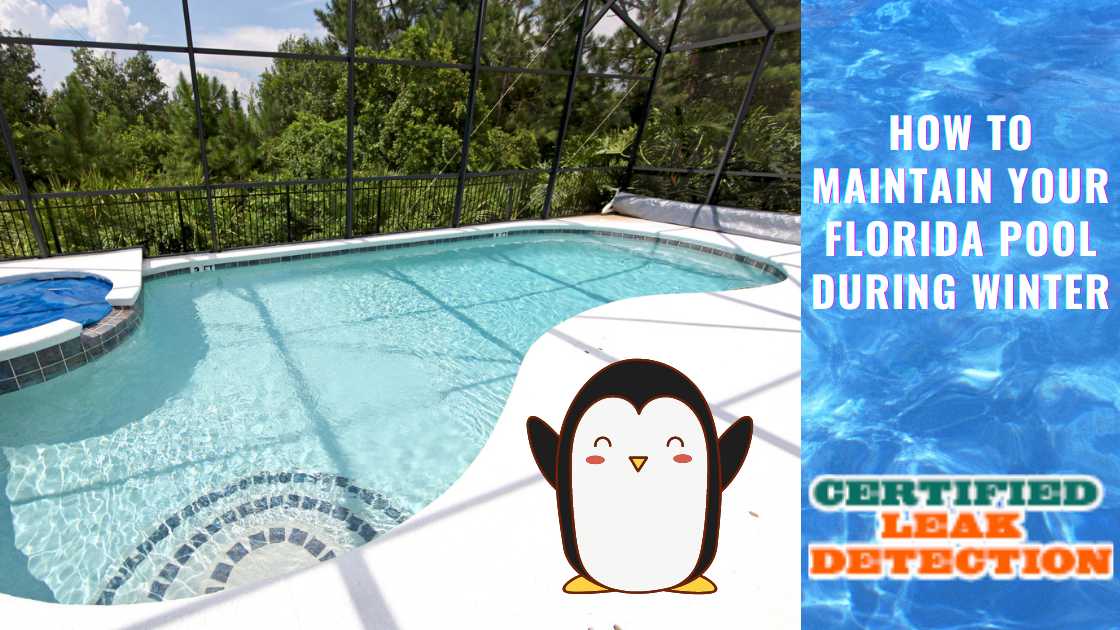
If this is your first year in the Sunshine State, congratulations! If you are fortunate enough to own a home with a swimming pool, you may be wondering how to maintain it during the winter months. Those from states that experience frigid temperatures and other harsh cold-related weather conditions will have to modify the pool maintenance practices you’ve become accustomed to – which we’re sure you don’t mind!
As we always remind our readers, Certified Leak Detection specializes in detecting leaks in pools, spas and fountains – as well as under concrete slabs. We don’t perform swimming pool maintenance, but we want people to enjoy their slice of Florida paradise to the fullest. Maintaining your pool properly will help you do just that! Plus, the more involved you are with your pool’s upkeep, the more aware you’ll be of conditions that may indicate a leak.
New to Florida? Don’t Drain the Pool!
You probably don’t really expect your pool to become an ice skating rink if you leave the water in, but old habits die hard. In Florida, draining the pool will do a great deal of harm, and absolutely no good. Our blog post – “Why You Should Never Drain Your Pool Yourself” – covers the numerous reasons to not drain your swimming pool, which include the following:
- When too much pool water soaks into the ground, the resulting upward water pressure (hydrostatic pressure) could crack the bottom of your pool or cause it to float right out of the ground.
- In the case of fiberglass pools, the floors can split altogether, necessitating repairs to the fiberglass shell, plumbing, side walls (which can bulge outwards or even pop as a result of the sudden lack of water pressure) and pool deck.
- For both inground and above-ground pools, the liner can shrink when the pool is drained, then tear when the pool is refilled. Refilling promptly and shifting the liner in the early stages of refilling can mitigate this. This is not a good idea with older liners.
- Excess ground water can cause pool liners to float away from the walls, causing wrinkles.
Don’t Go to Extremes – How to Modify Pool Maintenance
However, you do need to perform regular maintenance on your pool. If you haven’t yet acclimated to the point where you wear a winter coat when the thermometer plunges to 65 degrees F, you may even continue to swim – at least until January. But assuming you’re not going to enjoy a nice dip again until mid-spring, preparing the pool for winter is necessary.
People’s Trust Insurance and GPS Pools provide the following steps to take:
Continue cleaning – Keep your filter clean and vacuum as usual. Even though you are probably using your swimming pool less frequently during the winter months, if at all, it is still important to maintain a cleaning routine. Empty debris traps every few days to prevent leaves and rubbish from building up and clogging your pool’s filtration system.
Monitor water level – Due to evaporation, you may need to add water. As rainfall decreases and chilly days become more common, the water in your pool will begin to evaporate. Don’t be surprised if your water level drops one or two inches per week. To prevent your pool’s water level from getting too low, monitor it and add water as needed.
Prevent algae build-up – Test the water and keep it circulating. Even in winter, many areas of Florida are prone to algae bloom, due to fluctuating temperatures and weather conditions. Test your pool’s water chemistry and balance as needed. Since the water temperature will likely be cooler and there will be fewer people in the pool, you can reduce the chlorine level slightly. Also adjust the circulation pump’s timer setting to run four to six hours per day to keep the water circulating.
Change the chlorine production settings – Similar to your pool’s water circulation, its chlorine sanitation doesn’t need to run on full blast during the chilly months. Don’t be afraid to reduce your pool’s chlorine levels, slightly, to accommodate for colder water temperatures keeping algae and bacteria at bay. If you have a salt chlorine generator, turn down the amount of chlorine it produces. This will increase your system’s lifespan, sparing it from unnecessary runtime.
Invest in a pool heater – Why not make the most out of your swimming pool by investing in a pool heater? Since snow isn’t a factor, you can enjoy your well-maintained pool throughout the winter.
Our blog post – “Mistakes to Avoid in Preparing Your Pool for Winter” – goes into additional detail on some of the information offered here.
Get Annual Maintenance and Keep Your Eyes Open for Problems
Getting annual maintenance for your pool upkeep is always a good idea. When you have an annual maintenance contract, you can rest assured that your pool will remain in good condition. A single annual system check includes filter cleanings, chemical balance examinations, electrical checkups and more.
Another advantage is that a professional pool maintenance business has the right equipment, chemicals and supplies for the job.
However, despite the annual maintenance, it is crucial for pool owners to keep their eyes open for other issues – such as leaks. An undetected pool leak will increase your water bill and become worse over time, leading to extensive damage that will be more expensive to repair. Some leaks are easy to find, but there are many that pool owners can’t detect without professional assistance. Certified Leak Detection uses technology and techniques we have developed over 20 years in business.
In addition to quick detection and repair of swimming pool leaks, we provide industry-leading leak detection and repair for spas and hot tubs, as well as slabs and foundations. Serving areas throughout Central Florida – including Orlando, Longwood, Lake Mary, Sanford, Kissimmee, Clermont and Winter Springs – our team is ready to answer your call.
Contact us for quick, reliable service.
